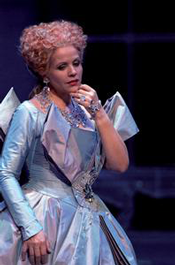
05 Oct 2008
STRAUSS: Capriccio -- Vienna 2008
Capriccio: Konversationsstück für Musik in one act.
Mozart and Salieri, an opera in one act consisting of two scenes.
Nicolai Rimsky-Korsakov (1844-1908), composer. Libretto derived from Alexander Puskhin's play of the same name.
First performance: 7 December 1898 in Moscow.
Ariadne auf Naxos, Oper with a prologue and one act. Music composed by Richard Strauss. Libretto by Hugo von Hofmannsthal.
La Vestale, a tragédie lyrique in three acts.
Boris Godunov, an opera in four acts with prologue
Modest Mussorgsky, composer. Libretto by the composer, based on Alexander Pushkin's drama Boris Godunov and Nikolai Karamazin's History of the Russian Empire
First performance: 8 February 1874 at the Mariinsky Theatre, St. Petersburg
Il Trovatore, dramma in four parts.
Only a few months following the premiere of Der Rosenkavalier, Hugo von Hofmannsthal proposed a new opera to Richard Strauss based on Molière’s comedy-ballet, Le Bourgeois gentilhomme (in German, Der Bürger als Edelmann).
Die Entführung aus dem Serail, Singspiel in 3 Acts.
Music composed by Wolfgang Amadeus Mozart (1756–1791). Libretto by Johann Gottlieb Stephanie the Younger, based on an earlier libretto by
Christoph Friedrich Bretzner.
Die Entführung aus dem Serail, Singspiel in 3 Acts.
Music composed by Wolfgang Amadeus Mozart (1756–1791). Libretto by Johann Gottlieb Stephanie the Younger, based on an earlier libretto by
Christoph Friedrich Bretzner.
Arabella: Lyrische Komödie in three acts
Die Entführung aus dem Serail, Singspiel in 3 Acts.
Music composed by Wolfgang Amadeus Mozart (1756–1791). Libretto by Johann Gottlieb Stephanie the Younger, based on an earlier libretto by
Christoph Friedrich Bretzner.
La Gioconda, dramma lirico in four acts.
Music composed by Amilcare Ponchielli (1834–1886). Libretto by Arrigo Boito (under the pseudonym Tobia Gorrio), based upon Victor Hugo's Angelo, Tyrant of Padua (1835).
Don Carlo, an opera in four acts. Music composed by Giuseppe Verdi (1813–1901). Libretto by Joseph Méry and Camille Du Locle after Friedrich von Schiller’s dramatic poem Don Carlos, Infant von Spanien. Revised version in four acts (French text revised by Du Locle, Italian translation by Achille de Lauzières and Angelo Zanardini).
Un ballo in maschera, a melodramma in three acts.
Music composed by Giuseppe Verdi. Libretto by Antonio Somma, based upon the work of Eugène Scribe Gustave III ou Le bal masqué (1833)
Medea: Melodramma tragico in three acts.
Die Tote Stadt, an opera in three acts.
Music composed by Erich Wolfgang Korngold (1897-1957). Libretto by Paul Schott (Julius and E. W. Korngold) after the novel Bruges la morte by Georges Rodenbach.
Some Details concerning the Revolution inaugurated by Rossini
Manon Lescaut, dramma lirico in quattro atti
Elektra: Tragedy in one act.
Lyric Opera of Chicago has announced both schedules and cast-lists for is Spring 2020 performances of Richard Wagner’s Ring Cycle. Given the series of individual productions already staged by the company since Fall 2016, that pave the way for the complete cycle, Lyric Opera of Chicago’s complete production should affirm the artistic might of the great composer.
“Diacono himself does not know what musical talent he possesses” – Mascagni

Capriccio: Konversationsstück für Musik in one act.
Streaming Audio
Music composed by Richard Strauss. Libretto by the composer and Clemens Krauss.
First Performance: 28 October 1942, Staatsoper, Munich.
| Principal Roles: | |
| Countess | Soprano |
| Count | Baritone |
| Flamand, a musician | Tenor |
| Olivier, a poet | Baritone |
| La Roche, director of a theatre | Bass |
| Clairon, an actress | Contralto |
| M. Taupe | Tenor |
| Italian Singer | Soprano |
| Italian Tenor | Tenor |
| Major-Domo | Bass |
Setting: A drawing-room in the Countess's chateau near Paris; May 1777
Synopsis:
In the Countess Madeleine's château, the composer Flamand and the poet Olivier listen to a rehearsal of Flamand's newly written sextet. They are both in love with the Countess, and argue the relative merits of music and words. The theatre director La Roche, waking up from a nap, explains that without impresarios their efforts are but lifeless paper. They leave to rehearse Olivier's new play, written for the Countess's birthday the following day. The Count enters, teasing the Countess that she is identifying Flamand with her love of music, while she retaliates that his love of words mirrors his admiration for the actress Clairon. While the Count enjoys fleeting encounters, the Countess desires long-lasting love but cannot choose between Flamand and Olivier. Clairon arrives and she and the Count read the latest scene, culminating in a love sonnet, before leaving for the rehearsal in the theatre. Olivier declares to the Countess that the sonnet is intended for her but, to his horror, Flamand sets it to music and sings it. Olivier is summoned to make cuts to his play. Flamand declares his love and the Countess asks him to meet her in the library the following morning when her choice will be revealed. Refreshments are served while the guests are entertained by dancers and singers. La Roche describes his planned birthday entertainment, the allegorical Birth of Pallas Athene followed by the spectacular Fall of Carthage. He is mocked, but defends his faith in the theatre, challenging Flamand and Olivier to create masterpieces that speak to humanity's heart and soul. The Countess commissions them to collaborate on an opera, and the Count suggests the theme should be the events of that afternoon. The Count and Clairon leave for Paris with the theatre company. With moonlight streaming in through the windows, the Countess learns that Olivier as well as Flamand will meet her in the library to learn how the opera is to end. Torn between them, she sings the sonnet that represents their inseparability. She consults her image in the mirror to decide the opera's ending. The major-domo provides the answer: 'Dinner is served'.
[Synopsis Source: Boosey & Hawkes]